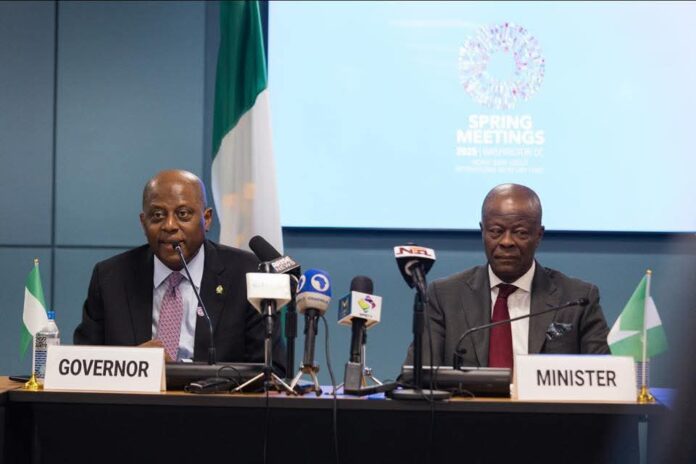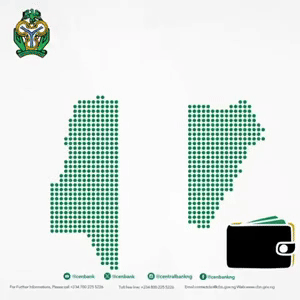The Federal Government says it recognises the threats of inflation to Nigerians welfare and is taking strategic measures to bring it down to single digit and expand investment frontiers to the economy.
Finance Minister and Co-Ordinating Minister for the Economy, Olawale Edun and Central Bank of Nigeria (CBN) Governor, Olayemi Cardoso, broke the news yesterday during a joint press conference between the Finance Ministry and the CBN at the end of the 2025 Spring Meetings of the International Monetary Fund (IMF) and World Bank Group, in Washington DC.
Cardoso said: “We recognize that inflation remains the most disruptive force to the economic welfare of Nigerians. Our policy stance is firmly focused on bringing inflation down to single digits in a sustainable manner over the medium term. Our goal is to restore price stability, protect household purchasing power, and lay the foundation for long-term investment”.
The CBN boss, said the recent Fitch Ratings upgrade, which applauded the exchange rate unification to reduce arbitrage in the markets, introduction of electronic FX matching platform and a new FX code to enhance transparency and efficiency in the market as well as deployment of monetary policy tightening to keep inflation on check, showed that the reforms are succeeding.
Edun, said Nigeria is targeting seven per cent economic growth, which represents a strong growth projection, under which poverty will be substantially reduced and lives of Nigerians significantly improved.
He said: “That’s a commitment and target, and the way to get it is by focusing on agriculture, increasing productivity, as well as making food more available to the people. Building more infrastructure, particularly in the digital economy area that will benefit young people, and supporting businesses through improved access to finance”.
Speaking on social protection for the poor, the finance minister said it is a promise of President Tinubu to make sure that the poor and the most vulnerable are not left behind in the benefits that come with the ongoing economic reforms.
“We have a social and direct benefit transfer programme. It started off and it wasn’t robust enough or up to standard, so we stopped it. We are back to the drawing board, and now have a standard that requires payments going out to people on the social register, and allow each person to be identified biometrically, through a National Identity Number. Each person has a digital methodology for reaching them,” he said.
Edun said that 20 million Nigerians are now on social register, with one million monthly addition, and target to hit three million monthly new entrants in near term.
Providing highlights on the outcome of the spring meetings, Edu said the meeting held at a time of global uncertainty, structural shifts, rising trade and geopolitical tensions, elevated interest rates and high debt levels for which, many of the heavily impacted countries are in Sub Saharan Africa.
He said although tariff hikes are impacting real wages and disruption of global supply chains disproportionately affecting Emerging Market Developing Economies (EMD’s) given the limited diversification of their economies and greater dependence on imported goods but domestic policy re-strategizing should be the first line of defense
“Fiscal policies should safeguard sustainability and rebuild buffers; remain investment friendly to create job opportunities and enhance resilient growth. Policy calibration should be toward further restoring confidence & stability, reduce imbalances and improve productivity to drive sustainable growth. Regional & cross regional economic integration and cooperation is critical,” he said.
He explained that in line with the Renewed Hope Agenda of Mr. President, Nigeria is already pursing growth-oriented policies through the various initiatives in agriculture & food security, road & rail infrastructure, social security as well as strong reform in both the upstream & downstream sectors of the oil & gas arena.
“The delegation had bilateral meetings with the President of the WBG and IMF where the Leadership expressed strong support for the Nigerian Government’s commitment to the ongoing reforms and encouraged Nigeria to remain focused and avoid complacency in undertaking structural (regulatory) reforms,” Edu said.
During the meetings, a high-level meeting was held between the Honourable Minister of Finance, the CBN Governor, and the Director of International Economic Relations, with representatives from the U.S. State Department. The U.S. emphasized the importance of continued engagement to showcase Nigeria’s ongoing economic reforms and attract investor confidence.
“Key areas of interest includes U.S. interest in investments in Nigeria’s natural gas sector particularly the Nigeria-Morocco Gas Pipeline given the country’s vast gas reserves. Discussions also highlighted opportunities in infrastructure, especially digital connectivity, where U.S.-led transatlantic fiber optic projects could indirectly benefit Nigeria and support broader digital development goals,” he said.
“Agriculture was identified as another strategic sector for collaboration, with the U.S. expressing interest in supporting Nigeria’s efforts to boost productivity, enhance value chains, and strengthen food security through investment and technical cooperation,” he added.
Edun explained that Nigeria’s reform efforts are strongly appreciated by the international community as the most credible way to economic prosperity. In-fact the US State Department described Nigeria’s reforms as an economic miracle.
“There is strong global appetite for investments in Nigeria and IFC’s continuing investment in Nigeria will be a strong signal for many more to come for the Nigerian Private Sector. Fiscal consolidation remains a critical element of the Nigerian Policy menu at this time. Nigeria agrees on the overarching theme of the 2025 WBG/IMF Spring Meeting that Job creation is the sure pathway to poverty reduction and improved livelihood,” he said.
Continuing, Cardoso disclosed that another key pillar of the reforms is a market-determined foreign exchange regime.
“We have embraced market-driven pricing for the naira, significantly enhancing transparency and restoring investor confidence. Again, thanks to disciplined reforms and policy clarity, the naira has stabilized at a more sustainable level against the U.S. dollar. The once-wide gap between the official and parallel market rates has all but disappeared, a first in Nigeria’s recent history, and speculative arbitrage has all but vanished”.
“This renewed stability has restored confidence and spurred autonomous inflows through formal channels. These inflows are diversifying our foreign exchange sources beyond oil,” he stated.
Cardoso said that the apex bank has strengthened its monetary buffers and positioned Nigeria to better withstand external shocks.
“Indeed, the macroeconomic stability we are beginning to see today would not have been possible without these decisive actions. Nigeria’s external buffers have also strengthened considerably. Our foreign reserves now exceed $38 billion, providing nearly ten months of import cover. This robust buffer enables us to better withstand external shocks – whether from declining oil prices or global financial turbulence – thereby safeguarding our economy,” he said.
Speaking further, Cardoso said that in 2024, Nigeria recorded a balance of payments surplus of $6.83 billion, the strongest in many years, driven by rising exports and renewed capital inflows.
“At the same time, we are enhancing the strength of our financial sector. The banking sector recapitalization is well underway, with strong momentum and stakeholder alignment, and will ensure that Nigerian banks are fully equipped to support the real economy with greater scale, stability, and capacity”.
“At these Spring Meetings, our development partners expressed their confidence in Nigeria’s trajectory. Feedback from global investors and the Nigerian diaspora has likewise been overwhelmingly positive, reflecting growing alignment with our economic direction”.


